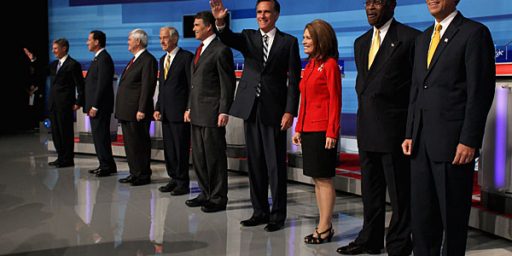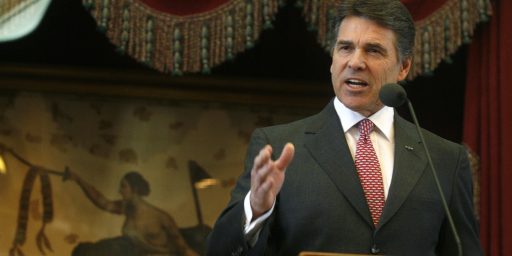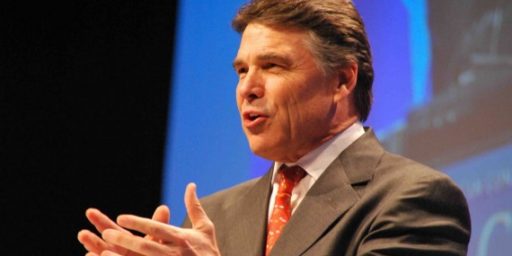Hanoi John?
Michael J. Totten argues that the fact that a Democratic candidate is touting his experience as a war hero is a very welcome change from the days when they felt the need to appear reflexively anti-military. Certainly true.
Indeed, among the great ironies in the last generation of American politics is that George McGovern and Jimmy Carter were perceived as so anti-military, when the former was a legitimate hero of WWII and the latter a Naval Academy graduate who gave years of honorable service. Carter also gets too much flack on the military front for his stint as commander-in-chief. While his pardoning of those who ran off to Canada to avoid the draft only four years after the war was over was deservedly thought to be a slap in the face to its veterans, the transformation into the high tech force that made us easily the number one power in the world began under his watch as well. From Richard Holbrooke:
When Jimmy Carter became president and Harold Brown became secretary of Defense, he gave Bill Perry THE job, THE technology job in the United States military establishment, the undersecretary of Defense for research and engineering, the famous DDR&E job, the top technology and buying job in the Pentagon, which was then structured a little less messily than it is today.
Along with Harold Brown, he developed the offset strategy, according to which superior Soviet numbers of troops and tanks would have to be offset not by American manpower, but by our unique strength; not raw numbers and not nuclear weapons, but technology. Bill Perry is widely regarded as the father of the stealth bomber, the F-117, the B-2, the C Shadow and other weapon systems and technologies that are still too classified to be revealed or else we’d have to shoot you. (Laughter.) The Global Positioning System, GPS, which you’re all familiar with, would not exist if it were not for Bill Perry. Use of reconnaissance satellites for support of military operations and development of precision-guided bombs were all pioneered by our guest this evening. By the time of the 1991 Gulf War, these weapons were in the inventory and dazzled the world by their performance. They are what the people in the Pentagon call the transformational generation of weapons.
Ronald Reagan gets a lot of the credit for this–deservedly so–for making this happen much faster because of massive funding. But Carter and Co. deserve some of the credit, too, and get virtually none.
Michael also points to this New Republic article which puts John Kerry’s remarks before the Senate in context:
Months before Kerry’s appearance before the Senate Foreign Relations Committee, vvaw had held what it called the “Winter Soldier Investigation” in Detroit, at which more than 100 Vietnam veterans testified to war crimes they themselves committed while serving in Vietnam. Those are the crimes to which Kerry referred in his Senate testimony, as a fuller version of his remarks–which, to National Review‘s limited credit, it did print in its actual article–makes clear. Speaking of the veterans who testified at the “Winter Soldier Investigation,” Kerry said, “They told stories that at times they had personally raped, cut off ears, cut off heads, taped wires from portable telephones to human genitals and turned up the power, cut off limbs, blown up bodies, randomly shot at civilians, razed villages in a fashion reminiscent of Genghis Khan, shot cattle and dogs for fun, poisoned food stocks, and generally ravaged the countryside of South Vietnam in addition to the normal ravage of war.” So, far from making the allegations himself, Kerry was simply repeating what other veterans themselves had admitted.
Now, Kerry was there and should have put in some huge disclaimers–emphasizing that the vast majority of the soldiers over there were serving honorably. But if this testimony is all there is to the “Hanoi John” charges, it would be not only morally correct but tactically wise to move on.





Or perhaps not. New Republic, while smarking about giving “limited credit” to NR for publishing Kerry’s remarks at length, fails to include one rather salient fact, of which I assume you are aware: That a significant number of the “Winter Soldier” ‘Vietnam vets’ were not vets and/or had not been to Vietnam.
It seems fair to me to demand an accounting about this from Kerry. Either he a) genuinely believed that his fellow servicemen were like that (in which case, we need to know what he himself was doing/witnessed over there and did not report, as was his duty as an officer to do); or b) he couldn’t tell the difference between someone who had been to Vietnam and someone who had not (in which case, we need to know if his judgment and discernment have improved in the meantime); or c) he simply didn’t care if their stories were true or not because they served his purposes (which, I suspect, is the correct explanation).
But if this testimony is all there is to the “Hanoi John†charges, it would be not only morally correct but tactically wise to move on.
I’m confirming a source I read, but apparently there is more to it.
Apparently while he was head of the VVAW (viet vets against war) he had members dressed up mocking U.S. soldiers.
They were in fatigues with pro-communist sayings painted on them and they marched in D.C. under the Viet Cong flag.
I even have a picture but I want to do more research before I pull a Kevin Drum.
(hmmm to be clear, Kerry was not in the picture. It was a picture of members of the group while he was the head. But quite, quite, damning)
He also apparently got out of Vietnam early via a loop hole. If you were “wounded” 3 times you could apply to go home. Apparently 2 of his “wounds” made him miss zero time and the 3rd one only made him miss 2 days.
He technically qualified but I don’t think it was meant for minor scraps. He played the system.
How is what Kerry did any different than what Sharpton did with Brawley? To repeat and amplify a serious charge without checking the facts is not trivial.
True on the Winter Soldiers being largely frauds. I’m not sure if there’s any reason for Kerry to have known that.
There were certainly war crimes committed by American soldiers in Vietnam. I’m not sure at what point drawing attention to that fact without balancing it with the limited nature of it becomes unpatriotic.
And I don’t know enough about Kerry’s other activities to compare him with Sharpton. It may well have been that a lot of his actions were beyond the pale; it just seems that this particular testimony that has been the basis of a lot of the criticism to date has been taken out of context.
What did Kerry know and when did he know it? Can we get some dental records?
Kerry probably didn’t know that the Winter Soldiers were frauds at the time. If there was doubt he probably gave them the benefit since humans, even cnn reporters, are biased and tend to believe what they’d like to believe.
However, I think Kerry owes it to the veterans who served in Vietnam some level of a recantment or at least an acknowledgement. He wants you to vote for him because he’s a veteran but he doesn’t even serve on the committee for veteran affairs or whatever it’s called. Seems like he in an estranged band of brothers. My suspicion is that he doesn’t serve on the committee because veterans generally hate him and he’s to arrogant to apologize. Presidential material for sure.
The issue in my mind is and always will be this: Kerry switched sides. And I suspect because he expected that would get him attention, if not outright votes. And, yes, changing your opinion is a right, and perhaps utter rigidity is undesirable in a politician. But Kerry offers no indication that he will be consistent on anything. That shows in his wavering support for the war on terror and his personal life.
—